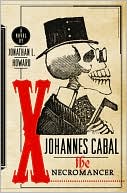
by Jonathan L. Howard
Faustian novels don’t come along every day. Inexplicably, I’ve read two in a row. However, Johannes Cabal the Necromancer and The Angel’s Game are as different as night and day. If Carlos Ruiz Zafon’s dark gothic drama is night, then Jonathan Howard’s light comic fantasy must be day.
As the novel opens, Johannes is pursuing an audience with Satan, to whom he sold his soul some years earlier in exchange for the secrets of necromancy. As you know, Satan never gives something for nothing. He proposes a wager—Johannes must collect 100 souls within a year’s time or forfeit his life as well as his soul. To aid in this endeavor, Satan lends Johannes a “carnival of discord.”
From there, the first half of the novel is picaresque, almost like a series of linked stories: Johannes and the Vampire, Johannes Meets a Ghost, Johannes Takes on a Madman. You get the idea. The second half of the novel is really an extended dénouement, and I’m not entirely sure the two halves join together gracefully. The latter half of the novel is more dramatic in tone and features less of the comedy that buoyed the opening.
When he puts his mind to it, Howard does have that distinctly British comic voice. Here are two brief examples:
* The mayor of Murslaugh was a jolly, ebullient man of the sort who, in a well ordered world, would be called Fezziwig. That his name was Brown was a powerful indictment on the sorry state of things.
* We’re supposed to be doing the devil’s work and you’ve gone and contaminated it all with the whiff of virtue. I really don’t think you’ve quite got the hang of being an agent of evil.
One of the problems with this novel is that it’s a redemption story. As the seeker of redemption, Johannes starts out as a fairly unlikable character, and remains so for much of the book. Truthfully, I generally wasn’t sure if I was rooting for or against him in his wager with Satan. His brother Horst is repeatedly described as “the charismatic one,” but we’re told this rather than shown. While Horst is definitely the more likable of the two, there are few characters to care about in this novel.
As I read, there was one revelation regarding Johannes’s motivation that I kept expecting to be revealed. I didn’t expect, however, to have to wait all the way until the penultimate paragraph of the novel. It’s an ending, of sorts, but leaves me thinking that we haven’t seen the last of Johannes Cabal the Necromancer.
Comment Permalink
Monday, June 22, 2009
Something wicked and whimsical this way comes...
Subscribe to:
Post Comments (Atom)
No comments:
Post a Comment